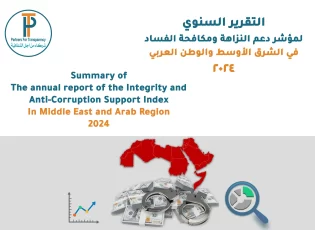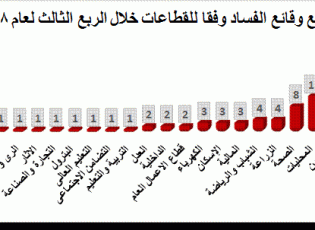The first report to assess electoral financing and spending in the Muharram Bek and Fayoum districts
Seven essential observations on funding and spending for candidates in the first phase of the parliament elections
Cairo, October 24, 2015
Smoothing
Started Partners for transparency PFT In implementing its initiative to monitor electoral financing and spending in a number of electoral districts, which was titled “ Our voices are facing your money ”, Since September 2015, and the initiative will continue until the end of the second phase of the parliamentary elections in December 2015.
The initiative aims to come up with general indicators about the nature of electoral financing and spending in the Egyptian elections, and to establish new, scalable tools that can be used extensively later to help civil society organizations, the National Elections Authority, the media and parties to monitor, control and regulate the use of money in the electoral process.
This “preliminary” report deals with a quantitative analysis of the results of field monitoring carried out by the “Our Voices Against Your Money” initiative team in two electoral constituencies in the governorates of Alexandria and Fayoum, namely, Muharram Bek constituencies in Alexandria, which have 36 candidates, and the Fayoum city district in Fayoum, which nominates 27 candidates for its seats.
The monitoring process included the full list of candidates for Muharram Bek constituency (36 candidates), while it included 21 candidates from Fayoum district, due to the inability to reach 6 candidates in the constituency for logistical and organizational reasons.
The monitoring process relied on collecting information from various sources, the most important of which is communicating with the candidate or one of his electoral campaign members, as well as monitoring the manifestations and activities of the electoral campaign for each candidate, in addition to collecting field certificates from voters registered in the electoral district.
The monitoring period was limited to the legal period specified for electoral propaganda, which lasted from September 29, 2015 to October 16, 2015. It was carried out by a trained field team, in addition to a specialized committee formed in each department consisting of financial agents, advertising specialists, and community activists.
Department of Muharram Bek, Alexandria Governorate
First: Information provided by the candidate or his election campaign officials:
The data in Table No. 1, which we obtained directly from the candidate or one of his election campaign officials, indicates that in the Muharram Bek district in Alexandria, the vast majority of the candidates did not record their campaign accounts in a regular register (91.7% of the candidates), as indicated The data indicated that most of them (58%) refused to disclose whether or not they received cash donations, while only (8.3%) reported receiving in-kind donations, while 55% refused to disclose it.
Regarding the presence of a chartered accountant in the campaign, there are 19% of Muharram Bek constituency candidates who reported the presence of an accountant in their campaign, while about 16% of them reported that there is no accountant, while 65% refused to disclose the existence of the accountant or not.
Table No. “1”
| Information provided by the candidate |
Candidate position |
||
|
Yeah |
No |
Declined to answer |
|
| Having a regular record of accounting |
3 |
0 |
33 |
| Receive cash donations |
0 |
15 |
21 |
| Receive in-kind donations |
3 |
13 |
20 |
| The presence of a registered accountant preparing financial reports |
7 |
6 | 23 |
The main source of financing for the election campaign
The data in Table “2” indicates that approximately 65% of the candidates in Muharram Bek district in Alexandria reported that the main source of funding for their election campaigns is personal resources, while 35% reported the existence of other resources such as the candidate parties on their lists.
Table No. “2 ″
|
Personal resources |
Other resources such as parties |
| 23 |
13 |
Second: Prohibited electoral financing:
The data contained in Table No. 3 indicates that 65% of the candidates in Muharram Bek constituency practiced election campaigning in a period prior to the specified legal period, and there were 33% of them who used houses of worship in electoral campaigning, while there were no recorded cases of using civil organizations and government facilities.
Table No. “3”
|
Banned electoral financing |
Candidate position | |
| Yeah |
No |
|
| Practicing advertising prior to the legal period |
23 |
13 |
| Use of places of worship |
12 |
24 |
| The use of community organizations |
0 |
36 |
| Use of government facilities |
0 |
36 |
Third: Prohibited electoral spending
The data included in Table No. 4 indicate that cases have been recorded of paying voters financial bribes to 5.5% candidates in the Muharram Bey district. Field monitors also recorded the same percentage of making promises to provide financial or in-kind bribes.
Table No. “4”
|
Banned electoral financing |
Candidate position | |
| Yeah |
No |
|
|
Distributing bribes |
2 |
34 |
| Distributing bribes in kind |
0 |
36 |
| He promised to distribute financial or in-kind bribes |
2 |
34 |
Fourth: Transparency of Electoral Funding and Expenditure:
The data in Table “5” indicates that only one candidate in Muharram Bek constituency was keen to announce the bank account number for the election campaign, and only one candidate announced the sources of financing his election campaign to voters, while no candidate announced the size of Electoral campaign spending
Table No. “5”
|
Banned electoral financing |
Candidate position | |
| Yeah |
No |
|
| Announcing the bank account number |
1 |
35 |
| Announcing the sources of financing the election campaign |
1 |
35 |
| Declare the size of the electoral spending |
0 |
36 |
Fayoum City Department in Fayoum Governorate:
First: Information provided by the candidate or his election campaign officials:
The data in Table No. 6, which we obtained directly from the candidate or one of his electoral campaign officials, indicates that in the Fayoum district in Fayoum, which included 21 out of 27 candidates while 6 candidates could not be reached, the majority of the candidates did not register accounts. Their electoral campaigns are in a regular record (65.7% of candidates), and the data indicates that the vast majority of them (90.7%) reported not receiving cash donations to finance their campaign, while most of them (57.5%) reported receiving cash donations.
Regarding the presence of a chartered accountant in the campaign, 76% of Fayoum city district candidates reported that there is no accountant in their campaign, while about 14% of them reported the presence of an accountant.
Table No. “6”
|
Information provided by the candidate |
Candidate position | ||
| Yeah | No |
Declined to answer |
|
| Having a regular record of accounting |
7 |
14 |
|
| Receive cash donations |
2 |
19 |
|
| Receive in-kind donations |
12 |
9 |
|
| The presence of a registered accountant preparing financial reports |
5 |
16 |
|
The main source of financing for the election campaign
The data contained in Table “7” indicates that all the candidates in the Fayoum city district in Fayoum reported that the main source of financing their electoral campaigns is personal resources.
Table No. “7 ″
|
Personal resources |
Other resources such as parties |
| 21 |
0 |
Second: Prohibited electoral financing:
The data contained in Table No. 8 indicates that 28.6% of the candidates in the Fayoum constituency practiced election campaigning in a period prior to the specified legal period, while there were no recorded cases of using places of worship or NGOs and government facilities in the campaigning process for the candidate.
Table No. “8”
|
Banned electoral financing |
Candidate position | |
| Yeah |
No |
|
|
Practicing advertising prior to the legal period |
6 |
15 |
| Use of places of worship |
0 |
21 |
| The use of community organizations |
0 |
21 |
| Use of government facilities |
0 |
21 |
Third: Prohibited electoral spending
The data included in Table No. 9 indicate that no cases have been recorded for paying bribes to voters from candidates in the Fayoum city district, and field monitors have not recorded cases of offering in-kind bribes or promises to provide financial or in-kind bribes.
Table No. “9”
|
Banned electoral financing |
Candidate position | |
| Yeah |
No |
|
| Distributing bribes |
0 |
21 |
| Distributing bribes in kind |
0 |
21 |
| He promised to distribute financial or in-kind bribes |
0 |
21 |
Fourth: Transparency of Electoral Funding and Expenditure:
The data contained in Table No. 10 indicates that 80.1% of the candidates in the Fayoum city district did not announce the bank account number for the election campaign, and the same percentage did not announce the sources of funding for its election campaign, while 90% of them did not announce the size of the electoral spending. For his campaign
Table No. “10”
|
Banned electoral financing |
Candidate position |
|
| Yeah |
No |
|
| Announcing the bank account number |
4 |
17 |
| Announcing the sources of financing the election campaign |
4 |
17 |
| Declare the size of the electoral spending |
2 |
19 |
Final extracts
The results of the quantitative analysis of field monitoring of the candidates in the two districts of Muharram Bek in Alexandria, and the city of Fayoum in Fayoum revealed a set of significant results, many of which constitute the rules for electoral financing and spending regulated by the Law on the Exercise of Political Rights, and we can summarize the most important observations and their implications in the following points: -
- The first observation The candidates in the two constituencies in question are not obligated to record the accounts related to their electoral campaigns in regular records in the manner specified by the Law on the Exercise of Political Rights, which is the violation in which the vast majority of the candidates in the two constituencies occurred, which opens the door to questioning the true values of advertising expenditures Electoral for these candidates.
- The second observation What was most prominent in the Muharram Bey district was the lack of transparency and disclosure of the various aspects of the candidate’s election campaign, which was evident in the majority of candidates ’refusal to disclose the donations they received, or their denial of receiving such donations, as is evident in the two constituencies with regard to the reluctance of the vast majority of Candidates must announce their bank account number, the real values of their campaign expenditures, and the sources of funding for voters in their constituencies, and although the Law on the Exercise of Political Rights includes a clear loophole in that, as it does not lay down regulatory rules in this regard, political harmonization and the rules of integrity and transparency required candidates. Abide by that.
- Third observation : Related to the practice of electoral campaigning at other than its legal timings, and this observation was more prominent in the Muharram Bek district than in the city of Fayoum, where most of the Muharram Bek constituency candidates practiced electoral propaganda outside its official timing, which is a clear violation of the organizing rules contained in the Law on Exercising Rights Political
- Fourth note : It is related to the payment of electoral bribes, which were recorded on a small scale in Moharram Bek governorate in Alexandria, while no similar cases were recorded in the Fayoum city district.
- Fifth note It is considered a positive note, as there were no recorded cases of using NGOs or governmental establishments in the propaganda process in the two departments, while there were limited cases of using places of worship in the Muharram Bek district in Alexandria.
- The sixth note Related to the presence of a chartered accountant in the candidates' campaigns, as the results of monitoring in the two departments revealed that the vast majority of the candidates do not include legal accountants in their campaigns in the form specified by the Law on the Exercise of Political Rights, which opens the door to random funding and spending, and the form of financial reporting later, and reducing Confidence rates in the reality of revenues and expenses related to candidates' campaigns.
- The seventh note : Concerning the difference between the two constituencies in the extent and nature of the legal violations related to financing and electoral spending, as the Fayoum district was much better than the Muharram Bek district, which indicates that political money was more present, and the related violations are more prominent in the Muharram Bey district than in the city Fayoum, and the cultural, social and economic context in both spheres may have an important role in this. .
Short link: https://pfort.org/en/?p=676












